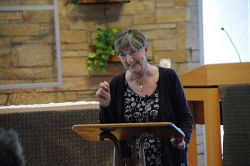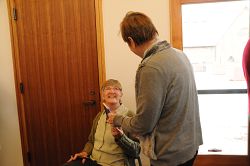Edwina Gateley at 2016 Aquinas Lecture: 'God calls all of us to do something in our lives'
Friday, Jan. 29, 2016

Intermountain Catholic
Photo 1 of 2
Edwina Gateley presents the 2016 Aquinas Lecture at St. Catherine of Siena Newman Center.
SALT LAKE CITY — According to her mother, Edwina Gateley was always a little odd – unlike the rest of her children, Edwina went to Africa in the 1960s to teach, then returned to England to form the Volunteer Missionary Movement, and despite the success of that effort and the public recognition that came with it, she abandoned it to seek a master’s degree from the Chicago Theological Union.
Her mother’s description of her – given at a farewell dinner before she departed for Chicago – is accurate, but Edwina Gateley is proud of it, she said Jan. 24 as she presented the 2016 Aquinas Lecture at St. Catherine of Siena Newman Center.
“I hope I will always be little bit odd,” she said, pointing out that as a Catholic she responds not to the world’s message of power and security and strength, but to the Gospel call of Jesus to “take care of the little ones.”
Gateley also gave a women’s retreat on Jan. 23 at the Episcopal Church Center that was attended by more than 60 women.
“I hope I will always be a sign of contradiction in our system, in our society, until all are fed and all are housed and all are clothed and there is no more war,” she told the crowd at the Aquinas Lecture. “We must be a sign of contradiction, we must be a little bit odd because we will go against the grain.”
Gateley went against the grain soon after receiving her teaching certificate. She felt a call to be a missionary, but the Church hierarchy in the 1960s questioned whether she could do so without becoming a member of a religious order. Declining to do so, she went as a volunteer to Uganda, where she taught for three years.
She had thought that she would teach the African people about God, but “the biggest shock that I got in Africa was the discovery that God got there before me,” she said, adding that her notion of God had been that he was white, Catholic and English, but she learned that he was much bigger than she had imagined him to be.
Returning home, she realized that she was bringing this big God with her, and “I didn’t want to cause trouble,” she said. “I was brought up to be a good Catholic girl. The only problem was, I went to Africa and came back a good Christian woman. … Getting involved with the Gospels is a dangerous business.”
Still, she felt she had done her bit for the Church, so she asked God to leave her alone, and told him “I want to be normal,” she said.
She did live normally, for a bit, but then felt the need to form a volunteer missionary group.
“God is incapable of leaving us,” she said. “We are too intertwined with God’s grace and God’s presence for there to be any separation. It’s just that we don’t see and we don’t feel it.”
She worked to form the missionary group for almost two years, but nothing seemed to come of it, so she returned to Africa on her own. However, the missionary societies of England, which she had contacted, collected $30,000 and offered her a house to use to found the missionary society, so she returned to her native country and created the Volunteer Missionary Movement, which today sends lay missionaries to serve the poor in 26 countries in Africa, Asia and Latin America.
“God calls all of us to do something in our lives,” said Gateley, who was recognized nationally for her work. “Our task is to recognize God wherever we may be, wherever we may go, to recognize the presence of God and proclaim that. That is the good news: God is with us.”
Rather than allowing her to rest on her laurels, God asked to her move on, she said, and after discerning the need for more formal education, she decided to get a theological degree.
Leaving England to come to the United States was difficult, Gateley said, because she was leaving her home and family as well as professional success. At least as difficult was what God called her to do after she got her diploma from the Chicago Theological Union; she had given him a list of seven things she thought she might do, but “God chose number eight, which wasn’t on my list,” she said.
That choice was to work with women involved in prostitution in Chicago. She fought that call, living in seclusion on a trailer in the middle of the woods for nine months, but finally acceded. Originally she was rebuffed by the women on the streets but she slowly got to know them. After learning their stories and facts such as 94 percent of prostitutes are incest victims or otherwise were abused as children, she realized “you’re dealing with kids in adult female bodies,” she said
In 1983 Gateley founded the Genesis House in Chicago, which helped more than 800 women, she said.
She didn’t remain with the Genesis House; these days she lives in Pennsylvania and gives retreats and workshops. She also is the author of 14 books.
“I know there is a God,” she said. “I know that God is with us and will never leave us. I know that God can move mountains, but the mountains we are talking about, they’re not the mountains outside of us. … The mountains are within us, mountains of fear and insecurity and doubt – those are the mountains that must be dispelled with a little bit of light and a little bit of hope.”
Gateley’s message, that everyone can make a difference, and “you just have to keep trying and somehow you’ll find a way to make a difference,” was very inspiring, said Bob Gilchrist, a St. Catherine of Siena Newman Center parishioner who attended the lecture.
Likewise, Gateley’s presentation resonated with St. Ambrose parishioner Noreen Mullen, who enjoyed hearing about Gateley’s experiences. “That’s a common theme that all of us feel, of wanting to help people in need,” Mullen said, adding that she particularly appreciated that Gateley is a layperson. “The message that I heard as a layperson was listening to your gut … to what God is telling you.”
For questions, comments or to report inaccuracies on the website, please CLICK HERE.
© Copyright 2024 The Diocese of Salt Lake City. All rights reserved.
© Copyright 2024 The Diocese of Salt Lake City. All rights reserved.


Stay Connected With Us